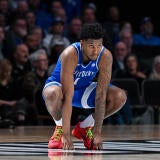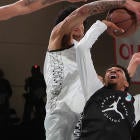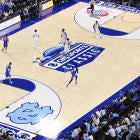
Time to overthink almost every game and use the stats, nuggets and goodies I've compiled below to help you gleefully fill out your bracket(s).
Behold, a heaping helpful of facts, stats, trends, did-you-knows and more that can expand your mind and induce plenty of self-doubt over the veracity of your picks. An annual rite of March! Let's uncover the best teams, players and trends across the men's NCAA Tournament.
In addition to my own research, all additional info is provided by CBS Sports' research team, the NCAA, KenPom.com, ESPN Stats & Info, Elias Sports, Sports Reference and BartTorvik.com.
Brackets are here! Get back in your pools and join our Men's and Women's Challenges for the chance to win a new truck and a college basketball dream trip!
Pick your favorite figure and have at it. The best sporting event of the year has officiall arrived.
- Highest-scoring team: Gonzaga (87.8 points per game)
- Lowest-scoring team: San Diego State (65.3 points per game)
- Fastest team: Gonzaga (73.8 possessions per game)
- Slowest team: Akron (63.8 possessions per game)
- Best free-throw shooting team: Villanova (82.3%)
- Worst free-throw shooting team: Boise State (65.0%)
- Best 3-point shooting team: South Dakota State (44.2%)
- Worst 3-point shooting team: TCU (30.4%)
- Most experienced team(s): Texas Southern (2.81 average seasons)
- Least experienced team: Arizona (.52 average seasons)
- Tallest team: Arizona (average height 79.4 inches)
- Smallest team: Longwood (75.6 inches)
- Deepest bench: Texas Southern (46.5% of minutes played)
Most efficient offenses, adjusted points scored per 100 possessions:
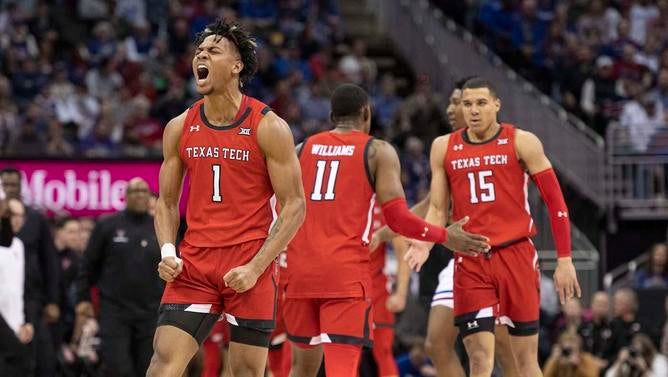
Most efficient defenses, adjusted points allowed per 100 possessions:
- Texas Tech (85.1)
- San Diego State (85.9)
- Tennessee (86.2)
- LSU (88.6)
Over the years, teams that have won it all have checked a lot of boxes. You can make the stats tell you a lot of things you want to hear. But if you've got a top-30 per-possession D and a guard that's definitely projected to be drafted, you've got a solid shot. Only a handful of teams meet this criteria each year. Four apply in 2022, one of which has two such players.
- Tennessee: 3rd (Kennedy Chandler)
- Arizona: 20th (Bennedict Mathurin)
- Kentucky: 27th (TyTy Washington)
- Kansas: 29th (Ochai Agbaji, Christian Braun)
- Best scorer: Bryant's Peter Kiss (25.1 points per game)
- Best rebounder: Kentucky's Oscar Tshiebwe (15.1 boards per game)
- Best assist man: Kentucky's Sahvir Wheeler (6.9 dimes per game)
- Best 2-point shooter: Gonzaga's Chet Holmgren (73.4%)
- Best 3-point shooter: Colgate's Oliver Lynch-Daniels (53.7%)
- Best foul shooter: Davidson's Foster Loyer (93.4%)
- Best thief: Richmond's Jacob Gilyard (3.9 steals per game)
- Best shot-blocker: Auburn's Walker Kessler (4.5 per game)
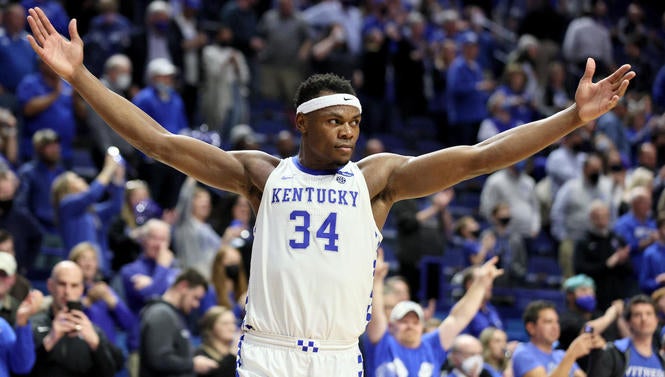
83: This is the 83rd NCAA Tournament. Thirty-seven programs have won a national title dating to 1939, when Oregon won its only championship. Two of the teams from the first Final Four are in the field this year: Ohio State was runner-up back in '39; Villanova was a semifinalist. (Oklahoma and Oregon aren't dancing.) Indiana, a 12, is the lowest-seeded team in this year's field with a national title.
0: The Gonzaga Bulldogs, Auburn Tigers, Texas Tech Red Raiders, Tennessee Volunteers and Purdue Boilermakers are the best-seeded teams in the field without a national title.
32: The percentage of brackets at CBS Sports that have Gonzaga winning it all. Second is Arizona at 15%.
27.6: Gonzaga's percentage to win the title, according to BartTorvik.com. For perspective, top teams normally hover around 15-20%, so Gonzaga is a dominant favorite. (Last year's undefeated Gonzaga team entered at 33.3%.) The top five for this year: Gonzaga, Houston (8.9%), Kansas (8.2%), Baylor (5.8%), Arizona (5.3%).
1: Only three times has the No. 1 overall seed won the NCAA Tournament since the selection committee began ranking the No. 1s in 2004: Florida (2007), Kentucky (2012) and Louisville (2013). The No. 1 overall seed has also lost in the second round thrice -- and the first round once. (UMBC forever.) Gonzaga is this year's No. 1 overall seed. It's the fifth time the Zags have made the top line.
13: Wisconsin and Purdue have 12 wins against teams in the field, the most of all dancers. Teams with no wins against 2022 tournament teams: Bryant, Cal State Fullerton, Chattanooga, Colgate, Delaware, Georgia State, Jacksonville State, Longwood, Montana State, Norfolk State, Saint Peter's, Texas A&M Corpus Christi, Texas Southern, UAB, Wright State, Yale.
2: Just two times since 2011 the WAC has sent a team not named New Mexico State to the NCAAs. The Aggies are back again.
0: Infamously, no team has lost its first conference tournament game and then won a national title. This year, you should be suspicious of Auburn, Baylor, Illinois and Wisconsin. They are the teams seeded fifth or better that were one-and-done in their league tourneys. (Additionally, every national champion since 1985 has made it minimally to the semifinals of their league tournament, if their league staged a tournament the year they won it all.)
12 of 23: In the past 23 tournaments, 12 national champions won their conference tournament. Since 1985, 15 national champions have won their league tournaments. There is no pattern at play here.
31 and 2: Arizona has the most wins (31). Murray State has the fewest losses (2).
14: Michigan's 14 losses are the most in the field. It's the second time since the NCAA Tournament expanded in 1985 to 64 teams that an at-large team (and a team from a power conference) has the most losses entering the Big Dance. (Maryland did this in 2021 with 13.)
42: It's been 42 years since Cal State Fullerton won an NCAA Tournament game, the longest drought for any team in the field that has previously made the tournament. The longest drought among power-conference teams in the field is TCU; it last won in 1987. Boise State has been D-I since '70 and never won a tournament game. This is its eighth tournament.
6-0: Norfolk State has the best neutral-court record in college basketball this season at 6-0. Who's No. 2? Arizona, Iowa and Montana State are 5-0.
1/18: For the second straight year, Alabama faced the fewest Quad 4 teams of all (1). Tennessee faced 18 Quad 1 foes, the most of anyone in the tournament, and went 11-7 in those games.
-23.5: Gonzaga's line against Georgia State is the biggest of the first round. Here's every line for every Thursday and Friday game.
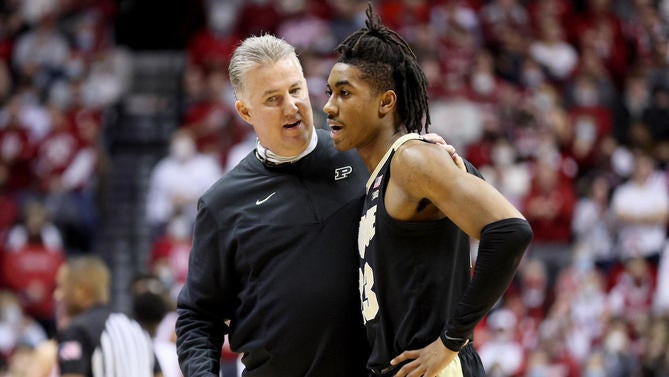
10: Coaches with top-four seeds to never have made a Final Four as a coach. I think at least one of these guys gets there.
- Tommy Lloyd (Arizona)
- Mark Adams (Texas Tech)
- Matt Painter (Purdue)
- Greg Gard (Wisconsin)
- Eric Musselman (Arkansas)
- Ed Cooley (Providence)
- Brad Underwood (Illinois)
8 for 11: In eight of the past 11 NCAA Tournaments, at least one 13-seed has defeated a No. 4. The most popular No. 13-over-No. 4 pick at CBSSports.com/on the CBS Sports app: Vermont over Arkansas (18%).
143-1: No. 1 seeds are 143-1 all time vs. 16s. The No. 2s are 135-9 against 15s.
6 or fewer: It took UMBC 33 years to become the first No. 16 seed to win. When will we see it again? Seven times a 16-seed has finished a game within six points or fewer of a No. 1 seed. Those results were: 2013 Southern vs. Gonzaga (64-58); 1996 Western Carolina vs. Purdue (73-71); 1990 Murray State vs. Michigan State (75-71 in OT); 1989 McNeese State vs. Illinois (77-71); 1989 East Tennessee State vs. Oklahoma (72-71); 1989 Princeton vs. Georgetown (50-49); and 1985 Fairleigh Dickinson vs. Michigan (59-55).
5 or lower: This is a 🚨🚨🚨 for your bracket: Every NCAA Tournament since 2013 has had a No. 5 seed or lower reach the Final Four.
2016: The last time all four 1-seeds reached the Elite Eight. Before that, it was 2009.
2009: The last and only other time one conference had as many as three No. 1 seeds. It was the Big East; Pitt, UConn and Louisville all did it. The Big 12 has two No. 1 seeds this year for the first time since 2003.
2008: Famously, the only time all four No. 1s reached the Final Four. But since 2010, only 15 of the 44 Final Four appearances have come from No. 1 seeds.
1-4: You almost never wanna go all chalk at the top in the first round. In 2017, all No. 1s 2s, 3s and 4s won their first-round game. Prior to that, the last time that happened was 2007. It's happened just six times since 1985.
59 vs. 52: No. 1 seeds have made the Final Four 59 times. That's more than the combined Final Four showings of Nos. 4-16 since seeding began (52).
No. 2: Only two times in the past 24 NCAA Tournaments have all four No. 2 seeds made the Sweet 16. It's happened just five times since 1985: '89, '95, '96, '09, '19. Pick at least one No. 2 to lose early. It's probably going to happen. Iowa and Ohio State got got in 2021.
12: Every seed, from No. 1 to No. 11, has made a Final Four. When does a No. 12 do it? This year the options are not inspiring: Richmond, New Mexico State, UAB, Rutgers and Indiana.
7: Though 7/10 games feel a bit like 8/9 games, they're not. No. 10s have never swept the 7s with the exception of one year. No. 8 seeds are 71-73 vs. 9-seeds all time.
10>8+9: You're more likely to make the Sweet 16 as a No. 10 seed than as either an 8 or 9. No. 10s are 18-34 vs. No. 2 seeds, while No. 8s are 14-58 and No. 9s are 6-65 vs. No. 1s. Breaking down the math further: No. 10 seeds historically have a 16.0% chance of making the Sweet 16, while the combined chances for No. 8s and No. 9s is 14.6%. Seeding matters. A 7-seed has made it to the Sweet 16 28 times since 1985. Contrast that to a No. 8, which has only gotten there 14 times.
6-10: In the past 10 NCAA Tournaments, teams seeded No. 5 or No. 6 that enter the tourney being ranked outside the top 30 at KenPom have a 6-10 record. While there's no team this applies to on the No. 5- or 6-line, it's worth noting that No. 3 Wisconsin is 34th and fourth-seeded Providence is extremely low at KenPom (49th). (H/T, Jason Lisk.)
65.9-to-1: Per bracketodds.com's calculator, those are the chances we'll have four No. 1 seeds reach the 2022 Final Four. If you go to all No. 2s, it's 372.4-to-1. Two No. 1s and two No. 2s -- a popular combo this year -- is 25.4-to-1.
9,223,372,036,854,775,808: The number of different possible bracket outcomes. Wondering how to pronounce that number? I got you. That would be nine quintillion, two hundred twenty-three quadrillion, three hundred seventy-two trillion, thirty-six billion, eight hundred fifty-four million, seven hundred seventy-five thousand, eight hundred eight. It's much larger than the number of possible outcomes seen by Doctor Strange in Avengers: Infinity War.
9: The Big Ten's nine bids lead all conferences. It ties the league's record.
30: Oklahoma, 30th at KenPom, is the highest team in that metric to not make the tournament.
39/72: Oklahoma's No. 39 NET ranking makes it the highest-rated team to not make the field, while Rutgers' No. 77 ranking is the lowest of any at-large in this year's field. The NET has existed for four years. Rutgers is now the record holder.
21 of 22: A top-three seed has won the national title 21 of the past 22 tournaments.
7: In nine of the past 10 tournaments, a No. 7 seed or lower has cracked the Elite Eight. Who's doing it this year?
1-34: The Big South has existed since 1986. It's 1-34 all time in the NCAA Tournament. The only win? Winthrop back in 2007. Longwood is making its NCAA Tournament debut and gets the strongest No. 3 seed, Tennessee.
Six for 16: Gonzaga's made the Sweet 16 in six straight tournaments. No other team has a streak longer than three.
17: The number of coaches who are making their NCAA Tournament debuts. The youngest: Loyola Chicago's Drew Valentine (30). The oldest: Texas Tech's Mark Adams (65).
28: It has been 28 years since a No. 6 seed made the Final Four. Who was it? Chris Webber and the Fab Five at Michigan. The highest-rated 6-seed per KenPom is Texas (15th). Last year, it was USC at 14th — and the Trojans were a win away from doing it.
19: Of 68 schools dancing, 19 have won a national title: UCLA, Kentucky, North Carolina, Duke, Indiana, UConn, Kansas, Villanova, Michigan State, San Francisco, Arizona, Arkansas, Baylor, Loyola Chicago, Marquette, Michigan, Ohio State, Wisconsin, Wyoming.
5: The only top-eight seed yet to win a national title is a 5.
+.194: Providence, a No. 4 facing No. 13 South Dakota State, rates as the "luckiest" team in the field, per KenPom. In the past 18 NCAA Tournaments, the luckiest team in the field lost its first game 16 times. The unluckiest team this year: Colgate, which happens to be facing Wisconsin, which is fourth in luck in this year's field. (Hmmmmm.)
20+: There have been three 20-point upsets against the spread in the NCAA Tournament since 1985: No. 15 Santa Clara (+20) over No. 2 Arizona in 1993; No. 15 Norfolk State (+21.5) over No. 2 Missouri in 2012; No. 16 UMBC (+20.5) over No. 1 Virginia in 2018. Norfolk State is a 21-point dog to Baylor, Georgia State is +23.5 against Gonzaga.
26/24: Tennessee coach Rick Barnes will be making his 26th appearance in the NCAAs. Tennessee as a program has been here two fewer times: 24.
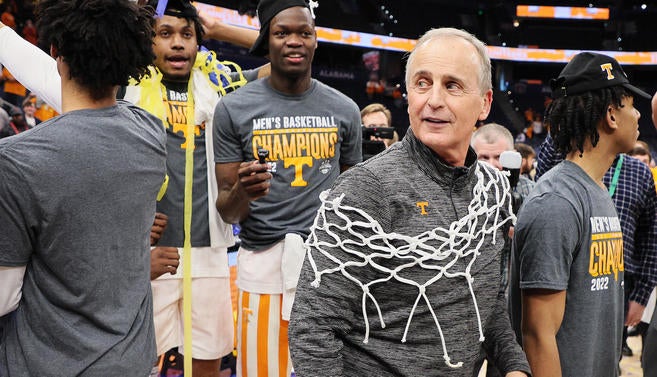
2,554: The distance as the crow flies from Smithfield, Rhode Island to San Diego International Airport, making Bryant's trip the longest, though Bryant won't fly that directly, as the Bulldogs need to get through the First Four first. If Bryant doesn't advance, Rutgers' trip to San Diego is the longest at 2,246 air miles (narrowly beating Seton Hall, also going to San Diego).
69%: Saint Peter's has the best cover percentage of all NCAA Tournament teams at 69%. That's nice. Longwood is second at 67.9%, Norfolk State third at 65.4%.
14: A No. 14 has beaten a No. 3 in five of the past eight NCAA Tournaments. Anyone feeling Colgate?
21: South Dakota State's 21-game winning streak is longest heading into the Dance.
33-10/.767: UNC has the best NCAA Tournament record/win percentage since 2008 (minimum of six games played).
2: The number of teams making an NCAA tourney debut. Welcome to the club, Bryant and Longwood!
0 for 39: The Northeast Conference is still the only league that has never won a first-round NCAA Tournament game. Bryant needs to get past Wright State -- and then Arizona -- to end the streak. Yikes!
32: Most consecutive NCAA tourneys: Kansas (32), Michigan State (24), Gonzaga (22), North Carolina (11). Kansas' Bill Self, absurdly, is coaching his 21st straight NCAA Tournament as a No. 4 seed or better.
35: Combined national championships for programs in the East Region, the most of the four regions BY FAR. The schools: UCLA (11), Kentucky (8). North Carolina (6), Indiana (5), San Francisco (2), Baylor (1), Marquette (1), Wyoming (1). Serious hoops history here.
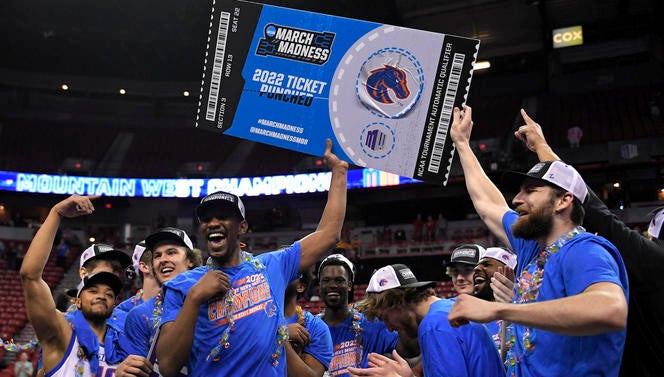
8: School in this NCAA Tournament with the most appearances to never win a game: Boise State (8).
11: The number of first round games with a point spread of -3 or less. (H/T, Chris Fallica.) We'll have two more potentially joining this group depending on who wins in the First Four. There are 32 first round games, and on paper, this sets up as the most competitive first round in a few years.
51: A No. 12 seed has won 51 first-round games since the field expanded to 64 teams in 1985. The '88, '00, '07 and '15 and '18 tournaments are the only ones since the field expanded to not have a No. 12 seed win. In 2019, three 12s did it. In the past 12 tournaments they are are 20-28 vs. No. 5s. Don't overlook No. 11s, though. That's still a real upset, and in the last five tournaments, No. 11s are 11-9 vs. the No. 6s.
.793: Michigan State coach Tom Izzo's winning percentage in the second round and Elite Eight. He is 23-6 in those games (i.e., on a two-day turnaround). Should Michigan State get past Davidson, it would potentially face No. 2 Duke. However: Izzo is 3-12 vs. Mike Krzyzewski.
24-17: Since seeding the field began, No. 1 seeds have more national titles (24) than the rest of the seeds combined (17).
10-15: Pick at least one double-digit seed to reach the Sweet 16, because it has happened all but two years since '85 (1995, 2007). And 15 times there have been at least three double-digit seeds that made it to the regional semifinals. In 2021, we had four: Oral Robert, Oregon State, Syracuse and UCLA. Challenge yourself. It's going to happen again.
7: Since 1980, there have been seven reigning champions that have made the Final Four the next tournament. It hasn't happened since Florida in 2007, which went a step further and repeated as champs. With Baylor as a No. 1, it's got a fair shot to end the drought.
9 for 10: There have been 10 NCAA Tournaments since the First Four's format was introduced. In nine of those 10 tournaments, a First Four team has won at least two games. VCU (2011) and UCLA (2021) went to the Final Four. Wyoming, Rutgers, Indiana, Notre Dame. Who will it be this year?
+350: Gonzaga's odds to win the whole thing, according to Caesars Sportsbook.







